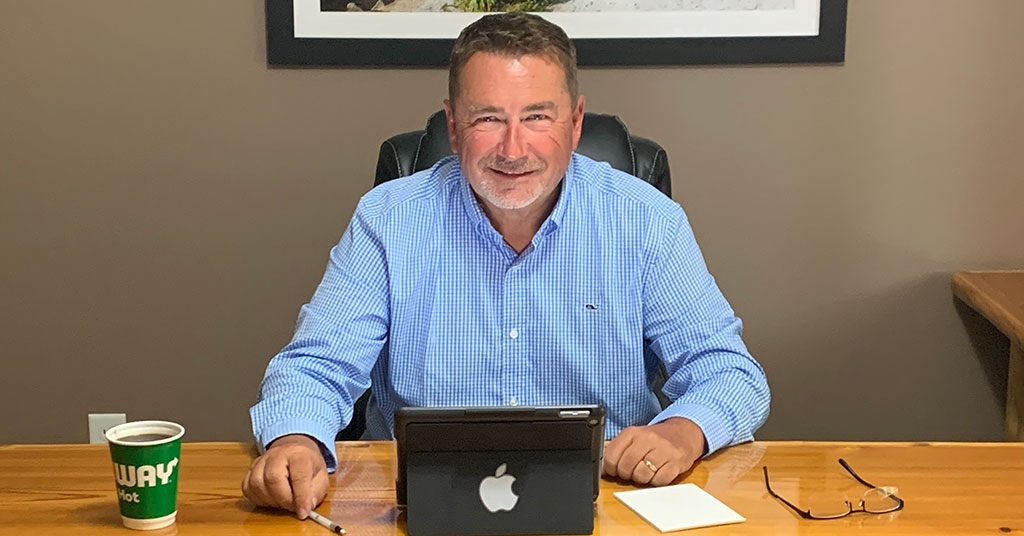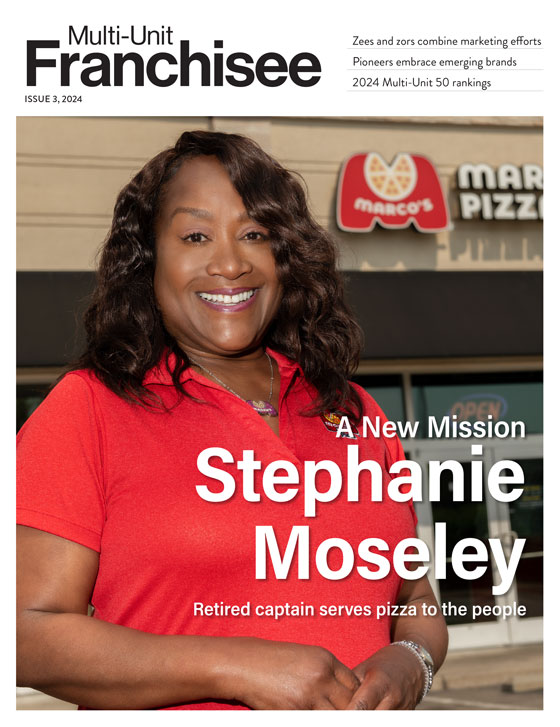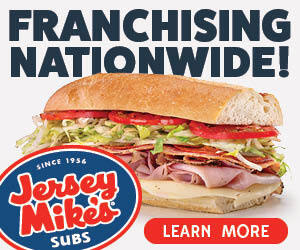The Subway to Success: Competitor couldn't Resist Taking a Risk

Name: Bill Mathis
Title: Franchisee
Company: Subway and Caribou Coffee
No. of units: 3 Subway, 1 Caribou Coffee with 4 under construction
Age: 58
Family: Wife Michelle, son Michael, 26
Years in franchising: 23
Years in current position: 23
Bill Mathis isn't afraid to take a risk in business, especially if it's a concept he believes in.
When Mathis was working as a franchise consultant for Subway more than two decades ago, one of the company's development agents said a restaurant in Crosslake, Minnesota, was about to close. He asked if anyone internally had an interest in buying it. Mathis knew the Subway concept was solid from his regular monthly visits to 35 Subway locations. He also knew the stores were profitable. He didn't have direct experience operating a restaurant, but that didn't stop the self-professed competitor from accepting the challenge.
"I had $500 in my bank account at the time, but I told him I was interested," Mathis recalls. "I told my wife about it, and she thought I was crazy. But I knew how successful I could be with the Subway brand. The development agent I worked for at the time helped me with financing, and looking back more than 20 years later, it was the best business decision I made."
Mathis' gamble has paid off with a successful career as a multi-unit franchisee. In addition to operating three Subway restaurants in Minnesota, he is helping his wife following the recent opening of a Caribou Coffee store in St. Petersburg, Florida. They have four more locations under construction in the area.
In addition to being multi-unit franchisees, the pair are in the process of developing their own brand. They plan to sell custom-made baked pizza by the slice. The first Slice Nation is expected to open in Tampa in 2025.
The competitor and his wife are betting on themselves again.
PERSONAL
First job: Snyder Brothers Drug Store in Apple Valley, Minnesota, when I was 16.
Formative influences/events: As a child, my parents made it a priority to attend Sunday school and church, learn the catechism, get confirmed, and learn and live the Ten Commandments. The belief in doing what is right was instilled in me at a young age. I'm also a very competitive person. I hate losing, and I really have no idea where that came from. I always felt disappointed if I lost playing Wiffle Ball or dodgeball as a young child. When I won, it was the best feeling. That competitiveness remains in me and carries into business.
Key accomplishments: Becoming chair of the North American Association of Subway Franchisees (NAASF) and vice chair of the Coalition of Franchisee Associations all in the same year.
Biggest current challenge: I am assisting my wife in bringing the Caribou Coffee brand to a new market in St. Petersburg, Florida. There are other more established coffee brands in the market, and we need to familiarize local customers with the concept.
Next big goal: My wife and I are co-founders of a new concept, Slice Nation, which offers custom-made and baked pizza by the slice. We are planning to open the first location in 2025.
First turning point in your career: When I decided to purchase my first Subway restaurant in 2001. I did not have much money at the time, but I knew from experience that it would be a profitable venture.
Best business decision: Moving from Minneapolis to the Brainerd Lakes Area to open our first Subway.
Hardest lesson learned: You can't trust everyone. In the business world, some people will tell you one thing and do something else.
Work week: I work in some capacity nearly every day. I am frequently in communication with the stores and know the business and labor operations each day.
Exercise/workout: Playing golf.
Best advice you ever got: Get rid of debt as fast as you can and don't be afraid to walk away from a deal.
What's your passion in business? Seeing people on the team progress to new heights and make a career as a result of hard work and dedication.
How do you balance life and work? I struggle to completely separate myself from the business. When I do take a day off, I try to totally unplug and focus on other things unless an emergency arises.
Guilty pleasure: Chocolate chip ice cream with chocolate sauce, a load of whipped cream, and even more candy sprinkles with a cherry on top.
Favorite book: Anything written by Bob Rotella.
Favorite movie: "National Lampoon's Christmas Vacation."
What do most people not know about you? I was once a professional bass fisherman.
Pet peeve: People who are late and events that start late.
What did you want to be when you grew up? Pro basketball player.
Last vacation: The Bahamas in January 2024.
Person you'd most like to have lunch with: My wife Michelle.
MANAGEMENT
Business philosophy: Do what's right and stand by your principles. Treat people right and do unto others as you would have them do unto you. I'm a big believer in what comes around goes around. If you do right for someone today, that act will eventually come back to you at a certain point.
Management method or style: I always want to hear the other side or see the other view before reacting in any way.
Greatest challenge: Handling stress. I often try to deal with it by taking a break and thinking about the best way to handle the situation. I may take a step back by going for a walk, reading about something else, hitting golf balls, or having lunch with my wife.
How do others describe you? Dedicated, honest, and a leader.
One thing you're looking to do better: Balance my time. Ideally, I would like to play more golf and work less. Maybe be in the office four to five days a week.
How you give your team room to innovate and experiment: I encourage people to bring ideas, and when they do, I listen to them.
How close are you to operations? I have a pulse of what's going on every day. I check the metrics and sales numbers for each of our stores daily.
What are the two most important things you rely on from your franchisor? Communication and transparency. When it is good and they listen to franchisees, it becomes a magic formula. If you don't have that, you have tense relationships, and it brings both sides down.
What you need from vendors: Having open communication and being transparent is also important in our relationship with vendors as well as getting the best price and service.
Have you changed your marketing strategy in response to the economy? How? Subway frequently offers discounts and promotions, but we are limited in the amount of marketing beyond that. Since we are bringing Caribou Coffee into a new market, we can be a bit more aggressive in discounting.
How is social media affecting your business? It affects all of us. One day, you think you have it figured out. The next day, something changes, and it's almost back to square one. I do think people are getting a better pulse of how to best use social media today than just two or three years ago.
How do you hire and fire? Focus on hiring the right person. You can teach skills, but it's much harder to teach personalities. We rarely fire as most employees eventually leave on their own.
How do you train and retain? I provide them the tools to perform and stand side by side with them. Retention often depends on the culture you create and how you treat the team. At the end of the day, income still does matter to team members.
How do you deal with problem employees? Document, coach, and repeat until they either correct it, feel this isn't for them and leave, or we have to terminate their employment.
Fastest way into your doghouse: Lie to me.
BOTTOM LINE
2024 goals: Launch a concept in which my wife and I are co-founders. Work hard to form a strong relationship between NAASF and Roark Capital. Continue to assist my wife in developing Caribou Coffee locations in Florida.
Growth meter: How do you measure your growth? Growth can mean a lot of things, and it can be measured in different ways. I measure my personal growth by the positive impacts I make on the business today, this week, this month, and this year. We can't be successful if people on our team don't feel like they are a part of something.
Vision meter: Where do you want to be in five years? 10 years? In five years, slowing down and playing way more golf. In 10 years, I hope to do this interview again, which means I will have continued to grow and evolve my business.
Do you have brands in different segments? Why/why not? No, and I do not because the customer and your employee are different when you go from QSR to, for example, the hair-cutting industry. I would have to learn so many things all over. Do what you do best!
How is the economy in your region(s) affecting you, your employees, your customers? My team is receiving less in tips, and that might be a result of the economy, tipping fatigue, or both.
Are you experiencing economic growth in your market? It's a slowdown but not one I'm overly concerned about.
How do changes in the economy affect the way you do business? Staffing levels can change quickly, and of course, how we invest back into the business is affected by the economy.
How do you forecast for your business? For established businesses, I use past performance in conjunction with what I believe will happen based on trends that I see in the community.
What are the best sources for capital expansion? Local or large banks.
Experience with private equity, local banks, national banks, other institutions? Why/why not? We have relationships with lending companies and local banks.
What are you doing to take care of your employees? I do whatever I can to make their jobs easier even if it's something as simple as a labeling system or providing them with smallwares that make their jobs easier. Although some of those things come at a cost for me, they make the process easier and more efficient. It helps keep employees happy and leads to less turnover.
How are you handling rising employee costs (payroll, minimum wage, healthcare, etc.)? Many have raised menu prices. I have gone more than a year without raising prices, but we may need to raise prices soon. We try to be more efficient in scheduling and more productive with the work.
What laws and regulations are affecting your business, and how are you dealing with them? In Minnesota, the Earned Sick and Safe Time (ESST) and other laws are coming into play. We froze wages in 2024 as a result of ESST, which costs businesses real money.
How do you reward/recognize top-performing employees? We have employee-of-the-week and employee-of-the-month programs in place.
What kind of exit strategy do you have in place? Right now, all I think about is growth.
Share this Feature
Recommended Reading:
FRANCHISE TOPICS
- Multi-Unit Franchising
- Get Started in Franchising
- Franchise Growth
- Franchise Operations
- Open New Units
- Franchise Leadership
- Franchise Marketing
- Technology
- Franchise Law
- Franchise Awards
- Franchise Rankings
- Franchise Trends
- Franchise Development
- Featured Franchise Stories
FEATURED IN

Multi-Unit Franchisee Magazine: Issue 3, 2024

$81,930
$200,000





 The multi-unit franchise opportunities listed above are not related to or endorsed by Multi-Unit Franchisee or Franchise Update Media Group. We are not engaged in, supporting, or endorsing any specific franchise, business opportunity, company or individual. No statement in this site is to be construed as a recommendation. We encourage prospective franchise buyers to perform extensive due diligence when considering a franchise opportunity.
The multi-unit franchise opportunities listed above are not related to or endorsed by Multi-Unit Franchisee or Franchise Update Media Group. We are not engaged in, supporting, or endorsing any specific franchise, business opportunity, company or individual. No statement in this site is to be construed as a recommendation. We encourage prospective franchise buyers to perform extensive due diligence when considering a franchise opportunity.